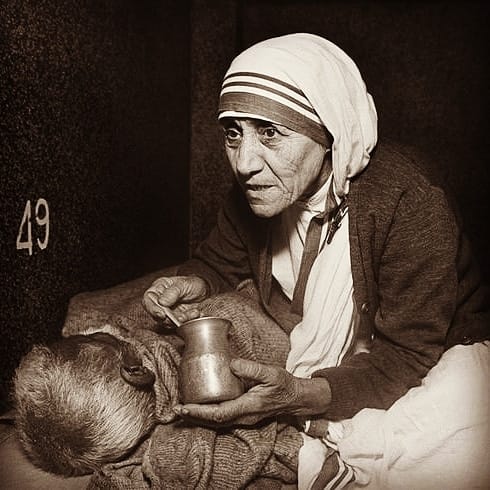
Mt. 13:24-43
Where is the kingdom of God? Who are the builders of this kingdom?
One of the most influential modern saints of the church is mother Teresa. She dedicated her whole to build the kingdom of God without any complaints. The mission to take care of the poorest of the poor was not a cakewalk for her. In the beginning days of her mission, she went to a merchant on the streets of Calcutta, expecting that she may get some contribution to carry on her mission. She stretched out her hand like a beggar and asked him: “Give me something for the poor, the hungry, the sick, and the lonely.” Sad to say, his reaction was so barbarous and arrogant. “Here, take this, and spat on her open palm.” She moved her arm back and wiped it on her sari and said to him. “Thank you. This is for me. Now give me something for my children.” This unpredicted gesture of Mother Theresa maid that man moved with tears.
I would like to quote also the experience of B. D. Sharma, the former Bengal IPS officer. He met her in the leprosy camp; Mr. Sharma narrates: “I was asked to visit the Gandhi Prem Niwas, as the ashram is called. I was not particularly looking forward to the meeting as I regarded Mother Teresa to be overrated and this I attributed to her being a foreigner working for India’s poor. But I changed my view when I saw her there. She was embracing the lepers, whom I couldn’t imagine even touching, as much as I am ashamed to admit it. She was running her fingers over their open wounds to soothe them, cleaning the oozing blood with her bare hands. This was a show of genuine compassion that cannot be faked. If this isn’t saintly, I don’t know what is.”
In today’s gospel, we see Jesus instructs his disciples as well as all those who gathered to listen to him about his kingdom through three parables. The first parable mentions about the enemy who sows darnel among the seeds. The owner does not allow labourers to remove darnels during their growth period because its elimination can cause harm to the good seeds also. Anyhow, the harvest begins with the elimination of weeds. The parable helps us to understand the nature of the kingdom preached by Jesus. The kingdom of God is already in our midst nevertheless, it is not a finished product. Its full-fledged realization happens at the end of time; sometimes, we may tend to think that why evil exists in the world? Many of our brethren think that if there is an omnipotent and omnipresent God, how evil can co-exist in this world? This parable throws light to understand this mystery in a better manner. God respects human freedom and provides ample opportunities for all and also those who act against the values and spirit of the kingdom of God. No matter how they have to be responsible for their actions. At the end of the time, they have to face the consequences of their deeds.
The parable of the mustard seed enlightens us about the nature of the kingdom of God. Mustard seed is insignificant in its size and structure. But it has the potential to become the biggest of all shrubs, giving shelter to many other living organisms. Similarly, when we analyze the formation of the kingdom of God does not have much external visibility; however, in all the ages and all the times, it has sheltered many by being the possessor of the economy of salvation as well as the divine graces.
Thirdly the parable of the yeast explains to us the mission of the kingdom in the world. Though it is insignificant in its stature its impact is great. A little yeast leaven the entire flour similarly the witness of the kingdom influences the entire world and provides ‘a sense of God’ to the entire world.
The kingdom preached by Christ does not have its boundaries and limits. It is open to all. At times we may think that what is the relevance of this kingdom of God preached by Christ? It is a sign of hope and salvation. The evil that we encounter is not the end, the reign of God will realize in its time. It may not have much visibility, but it is the compassionate face of Christ. It shelters all those who need love and care. The institutions run by the Church, caring homes and educational institutions should be like trees sheltering many living organisms above all this kingdom influences the entire world. When we inculcate all these attitudes in our lives the kingdom of God will be established in our hearts and we will be transformed as builders and building blocks of this kingdom like Mother Theresa. Let our life witness make this kingdom a visible reality.